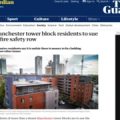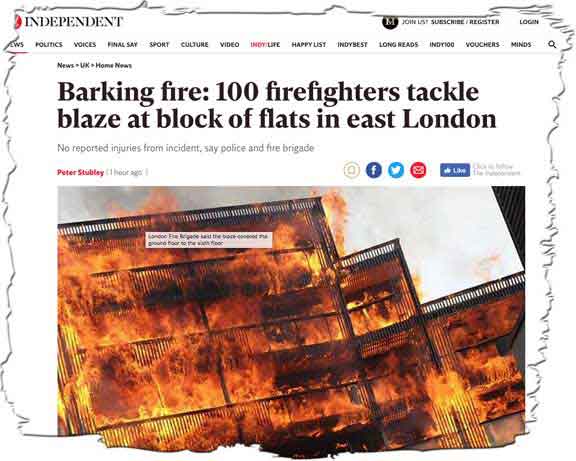
UPDATE: Statement from ARMA below
The Financial Times has reported the work-around by the leasehold sector and mortgage lenders to undo the damage caused by the government’s Advice Notice 14 which has made thousands of high rise flats unsellable.
The FT writes:
“Apartment blocks more than six storeys high will need to pass new fire safety checks before the flats can be bought and sold, in an initiative aimed at tackling post-Grenfell fire concerns, which resulted in thousands of homes being valued at zero.
“Surveyors and banks on Monday set out plans for a new fire safety certificate for external walls, aiming to enable sales of high-rise flats to resume after many were made unsaleable by valuers’ fire safety worries.”
New fire safety certificate to unlock UK high-rise flat market
Apartment blocks more than six storeys high will need to pass new fire safety checks before the flats can be bought and sold, in an initiative aimed at tackling post-Grenfell fire concerns, which resulted in thousands of homes being valued at zero.
There are concerns that the new process, which will not be a legal requirement, left a number of questions unanswered, including whether insurers would be prepared to provide personal indemnity cover for experts carrying out the checks.
This is a concern discussed by Nigel Glen, CEO of the Association of Residential Managing Agents, with LKP last month.
Thousands of home sales have been stopped since the government put out Advice Notice 14 on fire safety a year ago, with surveyors unwilling to attach value to high-rise apartments without expert certification that they comply with the latest advice. Instead the homes have been valued at zero, preventing owners from selling or borrowing more money against their properties.
John Baguley, tangible assets valuation director at the Royal Institution of Chartered Surveyors, said:
“To unclog areas of the market, a qualified and experienced fire safety expert will be appointed by the building owner to provide a report on the buildings cladding, and associated wall system, as an additional part of the valuation process.
“This will ensure safety, and will also ultimately allow the high rise property market to function properly.” The new process was devised by RICS, working with the Building Societies Association and UK Finance, which represents lenders.
Martin Boyd, chair of the campaign group Leasehold Knowledge Partnership, said: “We very much welcome this move forward by the sector in the absence of progress by the government on these matters.”
But he added that there was still a shortage of fire engineers to certify buildings.
Nigel Glen, of ARMA, told the FT that insurers — who have become increasingly wary of fire risk — would need to provide workable levels of personal indemnity insurance for assessors.
“If the PI insurance market does clam up then the assessors won’t be allowed to assess,” he said.
He added that some freeholders may not be contractually allowed to pass the cost of the certificates on to leaseholders, leaving a question of whether they will be prepared to pay. Mr Glen called for the government to extend its £200m fund for cladding replacement in privately owned buildings to help tackle what may be widespread safety problems.
Some 266,000 English households live in privately owned flats in buildings 18m tall or more, according to the English Housing Survey. Tighter regulations are applied above 18m as it is the height that wheeled escape ladders could reach, although such equipment is no longer used.
18th DECEMBER 2019: FOR IMMEDIATE RELEASE
ARMA response to cladding confusion for leaseholders
In December 2018, the Government issued Advice Note 14 (AN14) for anyone responsible for, or advising on, the fire safety of external wall cladding systems on residential buildings over 18m in height that do not incorporate Aluminium Composite Material (ACM), such as that found in Grenfell. The emphasis was on combustible systems such as wood and High-Pressure Laminate (HPL) installations. Although only an Advice Note this document is causing issues in the sale and re-mortgage of leasehold flats in affected buildings as some valuers are returning a £0 value on flats, thereby holding up sales.
ARMA (the Association of Residential Managing Agents) has been very active on the matter, taking the issue up with the Prime Minister’s Special Adviser, MP’s and the Ministry for Housing, Communities and Local Government (MHCLG). It is a member of the cross industry working group on valuations set up by RICS to address the matter.
Dr Nigel Glen, CEO of ARMA, said: “The unfortunate and unintended consequence of Advice Note 14 has meant that people trying to sell or re-mortgage their flats are finding that it is impossible to do so. This obviously causes a great deal of heartache and anguish to people. As the first point of contact with leaseholders managing agents are finding themselves blamed for matters that are not their fault, dating back, as they do, to when the building was first constructed.”
“There is a huge cross-industry effort in collaboration with the Government to unblock the valuations process. This week’s release of the External Wall System (EWS1) form will serve to help unblock the sales process.”
“It may be some small comfort for people to realise that the valuer putting a £0 value on a home doesn’t necessarily mean that a property is considered worthless – it is simply a technique used by valuers to place a hold on a valuation pending further information. Not all valuers and lenders are taking this approach and people trying to sell or re-mortgage would be advised to shop around.”





 Bellway to pay to remove wood from Barking Riverside fire site
Bellway to pay to remove wood from Barking Riverside fire site





















